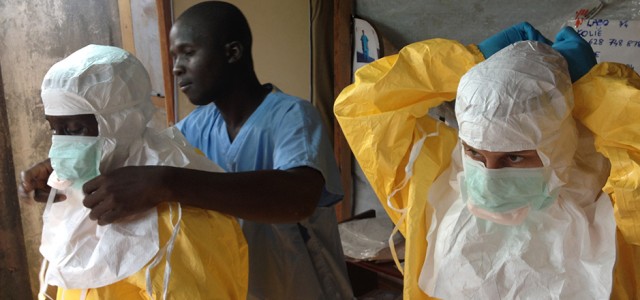THE EBOLA VIRUS, which can kill up to 90 percent of those infected, has spread rapidly in Liberia, Sierra Leone and Guinea, and also has moved into Nigeria. More than 1,350 people have died in Africa so far, and the outbreak shows no signs of slowing.
The situation in Africa is so dire that the World Health Organization (WHO) has begun working with the U.N.’s World Food Program (WFP) to ensure food delivery to 1 million people living in Ebola quarantine zones cordoned off by security forces on the borders of Guinea, Liberia and Sierra Leone.
So here is the question: If there is a medication that can save Ebola patients, why is the World Health Organization delivering food to at-risk people in Africa? Why don’t they just deliver the medicine?
But while the joint military and medical response in Africa has not staved off the epidemic that has killed at least 1,350 Africans, an experimental drug called ZMapp has been administered to two Americans. Thanks in part to that medication, Nancy Writebol and Dr. Kent Brantly, missionaries who contracted the virus while caring for stricken patients in Africa, are alive and virus-free.
So here is the question: If there is a medication that can save Ebola patients, why is the World Health Organization delivering food to at-risk people in Africa instead of simply delivering the medicine?
Well, the drug has actually been delivered to Liberia, according to a Daily Mail story. The problem? Only 12 doses were sent, because the manufacturer, Mapp Biopharmaceutical Inc., says it would take months to build up an even modest supply.
But there was enough to treat Brantly and Writebol, who may have received the drug under the FDA’s “compassionate use” provision. And Brantley’s condition began to improve within an hour of taking the drug, according to CNN.
Meanwhile, the specter of Africans dying in droves while white Americans are cured in weeks conjures images of racism. But there could be another reason the drug’s developers haven’t sent more ZMapp to Africa: Money.
The cost of curing Ebola
According to Forbes, a company attempting to get a drug to market can expect to spend $350 million before the medicine is available for sale. And large pharmaceutical companies can spend up to $5 billion per new medicine. Those costs can pay off big if a drug is successful. Lipitor, for example, peaked at sales of $13 billion a year.
But if the drug fails in the marketplace, or is somehow copied by competitors, that money can be lost, and the Return on Investment might never be realized. Nobody’s saying that, of course.
Instead, officials at Emory University Hospital, where Writebol and Brantly were treated, are downplaying the drug’s role in their recovery.
“They are the very first individuals to have ever received this agent,” Dr. Bruce Ribner, director of Emory’s Infectious Disease Unit, said at a news conference. “There is no prior experience with it, and frankly, we do not know whether it helped them, whether it made no difference, or even, theoretically, if it delayed their recovery.”
Perhaps that’s true. But I don’t think that matters to those who’ve contracted the virus in Africa. In Liberia, where there were 53 reported deaths from the virus between Aug. 14-16, I’m sure patients would be willing to risk being treated with an untested drug. Especially if the alternative is death.
The strategy for curing Ebola
But Dr. Ribner says it’ not just about the drug. Rather, it’s about replacing the electrolytes that Ebola patients lose due to the severe diarrhea they typically experience. Increasing the levels of minerals like potassium, magnesium and sodium in Ebola patients speeds recovery, Ribner said at the press conference, adding that “The key to resolving Ebola virus infection was aggressive supportive care.”
So let me get this straight. Not only is ZMapp unavailable to African patients. We also can’t get them high doses of potassium, magnesium and sodium. This, despite the fact that American patients can get such treatments immediately. … It should be an outrage to anyone who is watching.
So let me get this straight. Not only is ZMapp unavailable to the vast majority of African patients. We also can’t get them aggressive supportive care, or high doses of potassium, magnesium and sodium. This, despite the fact that American patients can get such treatments immediately.
Something about that picture is unbearably ugly, and it should be an outrage to anyone who is watching.
If, as the manufacturer says, it is working with government agencies and others to increase production of ZMapp, that production process must happen more quickly. And when that happens, the world’s approach to ending the Ebola outbreak in Africa must change.
The World Health Organization must de-emphasize shipping food to quarantined areas, and start shipping them the medicine that can save lives. It must stop pretending the people of Africa can’t be cured, when we’ve all seen the proof that they can. It must move on from celebrating the recovery of two people while ignoring the deaths of thousands.
As for the rest of us? We must stop pretending the crisis in Africa is not our problem, lest we wake up to an epidemic of our own.![]()
Photo: For the first time in West Africa, a case of Ebola was confirmed on 21 March, three weeks after the first alert of a possible viral hemorrhagic fever emerged from Guinea’s Forest region. European Commission DG Echo Flickr Creative Commons.
 Solomon Jones is an Essence bestselling author and award-winning columnist. His latest book is The Dead Man’s Wife, a mystery based on a pharmaceutical company’s fight for control of a multibillion-dollar drug. Click here to learn more about Solomon
Solomon Jones is an Essence bestselling author and award-winning columnist. His latest book is The Dead Man’s Wife, a mystery based on a pharmaceutical company’s fight for control of a multibillion-dollar drug. Click here to learn more about Solomon








